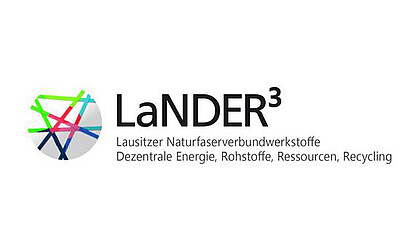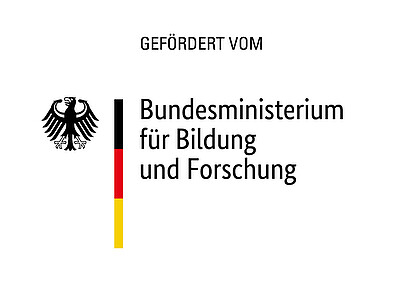Innovation platform futureSAX conducts interview with Prof. Jens Weber, project coordinator of LaNDER³ at the HSZG.

Knowledge and technology transfer takes place at various levels: Prof. Dr. Jens Weber knows this only too well. In addition to his work in the Chair of Physical Chemistry at Zittau/Görlitz University of Applied Sciences, Prof. Dr. Weber is also the coordinator of the LaNDER³ project. The idea behind it: Using natural fibres from regional plants, chemically optimizing them and combining them with plastics.
In an interview with the innovation platform of the Free State of Saxony futureSAX, he reveals more about his work, why SMEs in Saxony can benefit from it and how important cross-industry platforms are for knowledge and technology transfer.
futureSAX: Prof. Weber, you have held the Chair of Physical Chemistry at the Zittau/Görlitz University of Applied Sciences (HSZG) since 2014. Please briefly describe the topics you and the chemistry department at the HSZG focus on.
Prof. Dr. Weber : My main topics as a physical chemist include applied polymer chemistry as well as the use of highly porous materials to separate mixtures of substances. Current projects range from work in the context of natural fiber-reinforced polymers and water treatment to the investigation and modification of plastic surfaces, e.g. silicones. Overall, as chemists at the Zittau/Görlitz University of Applied Sciences, we are committed to applied research - each with our own areas of focus and in cooperation with SMEs.
futureSAX: The HSZG is a regional driver of innovation in Upper Lusatia. In your opinion, what significance does knowledge and technology transfer have for the economic development of the region?
Prof. Dr. Weber: A decisive one! As a university, we are involved in a wide range of collaborations with both local and national companies. Knowledge and technology transfer takes place at various levels - from student work in practical semesters to contract research. These two examples clearly illustrate important impulses for economic development: local companies can retain skilled workers for further development at an early stage, and companies with good ideas but no R&D department or experience in R&D can work with us to develop the idea into, ideally, a product. The joint efforts for economic development have been strengthened by other activities for some time, e.g. by the Lusatia Life & Technology alliance, but also by other activities in connection with the structural change process.

"We provide impetus that generates added value with and for SMEs in Saxony and Upper Lusatia." Prof. Dr. rer. nat. Jens Weber, Project Coordinator LaNDER³, Zittau/Görlitz University of Applied Sciences
”futureSAX: Prof. Weber, you are coordinating the project "Lusatian natural fibre composites: decentralized energy, raw materials, resources and recycling (LaNDER³)". What is behind this and how can SMEs in Saxony benefit from this project?
Prof. Dr. Weber: LaNDER3 is a strategic partnership between the HSZG and a whole range of other partners, primarily companies from the region, funded by the BMBF as part of the FH-IMPULS program. The scientific goal is to promote the sustainable and economical use of renewable raw materials. This takes place in a series of projects, not only at the HSZG but also directly in participating SMEs. The research activities focus on natural fiber-reinforced plastics (NFRP) and their entire product life cycle.
The projects, which build on each other thematically, address both the development of efficient technologies and processes for the production, refinement, use and recycling of NFRP and the generation of energy from biological residues during fiber production and recycling.
The partnership has been in the intensification phase since 2021 and will continue to develop dynamically. We will continue to develop satellite projects, network partners with each other, offer a shared factory with the laboratory hall that is about to be opened - in short, we will provide impetus that generates added value with and for SMEs in Saxony and Upper Lusatia. Feel free to contact us - we are not a closed club!
futureSAX: At the futureSAX Innovation Forum on September 15, 2022 in Görlitz, you will be discussing the opportunities of new materials for resilient supply chains with representatives from industry. What can interested companies and scientists expect?
Prof. Dr. Weber: Sustainability is on everyone's lips and also affects materials research; we in Zittau are working on NFRP, among other things. The big concept that is directly related to this is the bioeconomy. This is becoming increasingly important, also in order to reduce dependency on fossil raw materials, and is increasingly moving from the research context into greater industrial implementation. In this context, the question also arises as to whether (further) disruptive technologies are on the horizon? What challenges and opportunities are emerging? Specific questions, some of them provocative, could be, for example:
These questions and other topics can be discussed with us.
futureSAX: Prof. Weber, you and the Zittau/Görlitz University of Applied Sciences are represented in the Saxon Transfer Network. and the LaNDER³ project is supported by futureSAX alongside other Saxon transfer projects. supported by futureSAX. How important are cross-industry platforms for knowledge and technology transfer?
Prof. Dr. Weber : I have always been curious about the world - futureSAX is a place where new, sometimes at first glance "weird" ideas come together - for me an ideal place to receive new impulses and also to feed them back. In this sense, I think the interdisciplinary networks are extremely important, also to find the partners that are needed to realize exciting projects.
futureSAX: Prof. Weber, thank you very much for the interview.
You can find more information about LaNDER³ here.
On September 15, 2022, Prof. Jens Weber will be a guest at the futureSAX Innovation Forum in Görlitz. Among other things, he will speak and discuss the challenges and opportunities of the bioeconomy.


